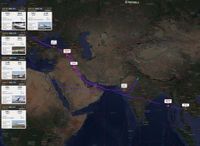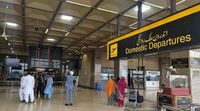A wave of flight cancellations and diversions struck Asia, the Middle East, and Europe on Wednesday morning as airlines rerouted aircraft to avoid Pakistani airspace, which remained closed following India's precision strikes on alleged terror sites across Pakistan and Pakistan-administered Kashmir. This escalation, one of the most serious between the nuclear-armed neighbors in over two decades, has left northern airspace across the subcontinent nearly empty of civilian aircraft, with both India and Pakistan suspending operations at key airports and multiple international carriers announcing route changes.
Flight tracking data from Flightradar24 showed more than dozens of flights canceled and rerouted as of Wednesday morning. Airlines from Europe, the Middle East, and Asia confirmed emergency mid-air changes and longer detours over the Arabian Sea and Central Asia to keep aircraft out of the conflict zone. Just a couple of flights were seen landing in Pakistan’s major cities around 1 PM local time, including one flight coming from Abu Dhabi to Lahore.
Gulf carriers like Emirates, Etihad, Qatar Airways, and Flydubai canceled flights to cities in northern Pakistan and India, including Lahore, Islamabad, Sialkot, and Amritsar. Emirates urged passengers “not to proceed to airports” in affected cities and confirmed that flights to Karachi remain operational. Etihad said three of its flights en route to Pakistan late on Tuesday were forced to return to Abu Dhabi. Services between Karachi, Lahore, and Islamabad have been suspended until further notice.
Flydubai, which had initially suspended flights, resumed limited operations to cities like Multan and Faisalabad, citing ongoing safety assessments. A spokesperson for Qatar Airways said passenger safety remains their priority. Qatar Airways has temporarily suspended flights to Pakistan due to the closure of Pakistani airspace. The airline is closely monitoring the situation and will continue to prioritize the safety of its passengers and crew.
KLM stated it would not fly over Pakistan until further notice. Singapore Airlines, Thai Airways, and Korean Air have also adjusted routes, adding several hours to some Europe-bound journeys. Taiwan’s EVA Air and China Airlines said that their long-haul flights to London, Milan, Frankfurt, and Rome have been either rerouted for refueling stops or canceled entirely. Korean Air said it had switched to a southern route bypassing Pakistan, now flying over Myanmar, Bangladesh, and India. Lufthansa’s Delhi-Frankfurt service was seen rerouting southwest near Surat, adding distance compared to its usual route.
Airline shares across the region, including EVA Air and China Airlines, dipped on Wednesday. The Association of Asia Pacific Airlines raised concerns about “GPS spoofing and operational disruptions” near conflict zones, warning these could become serious flight safety issues if not addressed.
India’s Directorate General of Civil Aviation (DGCA) ordered the closure of several northern airports including Srinagar, Leh, Jammu, Dharamshala, and Amritsar. Domestic carriers such as IndiGo, SpiceJet, and Air India suspended services to these destinations, with Air India offering refunds and rescheduling waivers to affected passengers. In Pakistan, all civilian airspace has been closed for 48 hours. The military indicated that 57 international flights were passing through its airspace when Indian strikes began.
The UK Foreign, Commonwealth and Development Office (FCDO) updated its travel guidance on Tuesday night. British nationals are now advised against all travel within 10km of the India-Pakistan border and against all travel to Pakistan-administered Kashmir. The advisory urges travelers to remain vigilant, monitor local news, and liaise with airlines for real-time updates. Travelers currently in India or Pakistan are encouraged to register with the FCDO’s travel alert system and consult the GOV.UK travel pages before making new plans.
In late April 2025, escalating tensions between India and Pakistan spilled into the skies as both countries issued reciprocal airspace bans. What started with Pakistan closing its airspace to Indian aircraft on April 24 was swiftly followed by India prohibiting Pakistani aircraft from entering its airspace just days later. The result was drastically altered flight paths, significant increases in flight time, and growing logistical headaches for both regional and international carriers.
International routes operated by Air India continue to be among the most directly impacted, rerouting most of its transatlantic services, adding both distance and complexity to operations. Routes to North America, which once passed efficiently over Pakistan and into Central Asia, must now divert south and west before looping back north, necessitating fuel stops en route. Air India has designated Vienna and Copenhagen as primary refueling points.
Some flights are doubling their flight times. For instance, the IndiGo service between Tashkent and Delhi, flight 6E1806, previously enjoyed a direct routing over Pakistan, resulting in a quick 2-hour 18-minute hop. Post-ban, the flight must detour over Iran and Turkmenistan, clocking in at around 5 hours and 30 minutes. Another example is Indigo flight 6E1801 from Delhi to Almaty, which has increased from an average flight time of 2 hours and 58 minutes to around 5 hours and 45 minutes, rerouting via Kyrgyzstan, Uzbekistan, Turkmenistan, and Iran.
Looking at Pakistani-registered airlines, notable examples include PK894, a service from Islamabad to Kuala Lumpur, which has increased from 5 hours 39 minutes to up to 8 hours 19 minutes. The flight from Lahore to Kuala Lumpur now takes up to 8 hours and 56 minutes, compared to a previous average flight time of 5 hours.
The situation has also affected European airlines. British Airways, Air France, and Swiss International Airlines have all made routing changes since April 30 to avoid crossing into Pakistan. NOTAMs issued for northern Pakistan have rendered key airways unusable until at least the end of May. These disruptions have caused wide-reaching adjustments to flight paths, with aircraft from these carriers weaving around the affected region, often flying hundreds of miles out of the way.
As of 11:00 GMT on Wednesday, Pakistan’s Dawn quoted a Pakistan International Airlines spokesman as saying that the Pakistani airspace has been restored for flights. However, it remains unclear when airlines would resume their operations fully. The evolving situation continues to impact air travel significantly, with the duration of its effects still uncertain.







